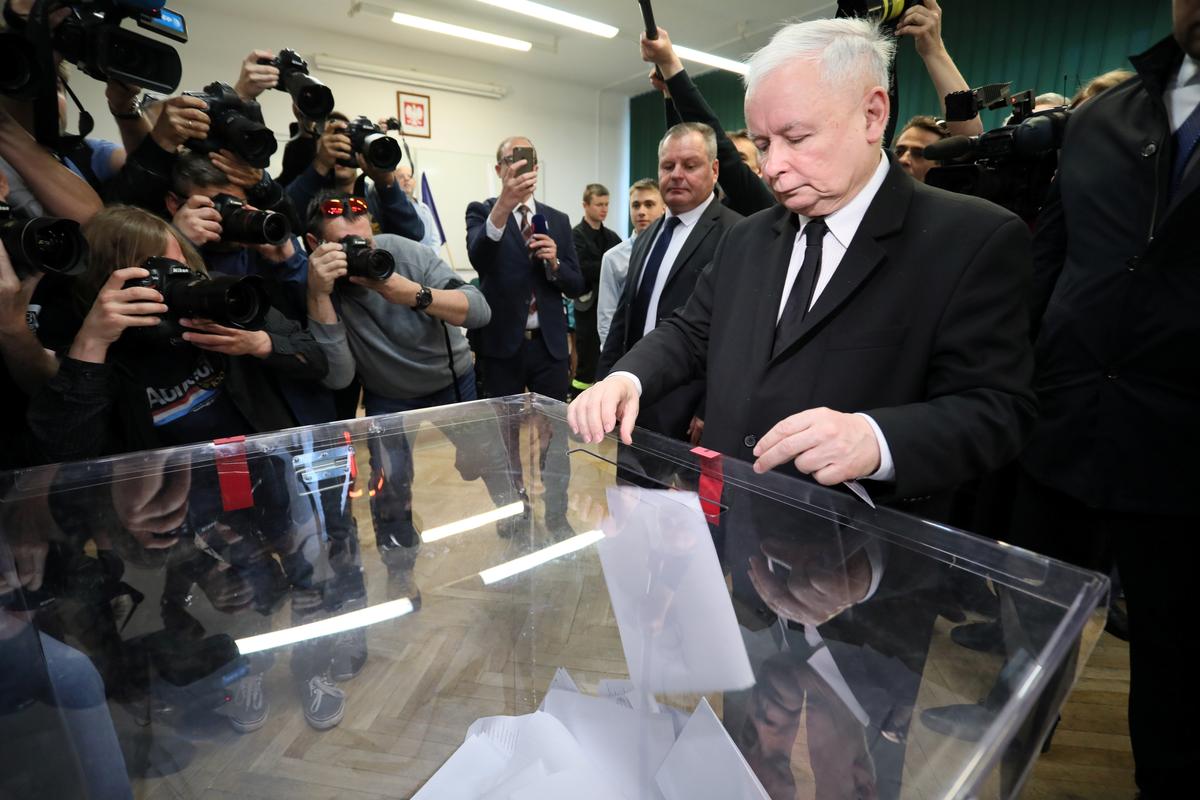
WARSAW (Reuters) – Poland’s ruling Law and Justice party (PiS) came out ahead in Sunday’s European Parliament vote, seen as a test of the party’s nationalist, euroskeptic platform before a national election later in the year.
The results calculated by the state electoral commission on the basis of 96% of polling stations showed PiS heading for its best result ever in a general or European Union election with 46% of votes. It won 31.8% in the EU ballot five years ago and 37.6% in the 2015 parliamentary election.
The opposition European Coalition, comprising the Civic Platform formerly led by European Council President Donald Tusk and a group of leftist and rural politicians, was second, with 37.9%.
The strong showing by PiS will bolster a growing chorus of populists in Europe who share the broad goal of returning power to EU member states and strict limits on immigration.
Voter turnout stood at 45.4%, a record for a European election in Poland, following an acrimonious campaign dominated by issues such as gay rights, the legacy of the Holocaust and the role of the Catholic Church in public life.
PiS had framed the European ballot as a battle against Western liberal ideals, which it says threaten the traditional way of life in Poland, a staunchly Catholic country.
Another term in office for PiS following the national vote in October or November could increase Poland’s isolation in the European Union amid criticism that the party is tilting towards authoritarian rule.
“We have to remember the decisive battle for the future of our homeland will take place in the autumn,” PiS leader Jaroslaw Kaczynski told party supporters after the exit poll results.
Kaczynski said ahead of the European election that in casting their votes Poles would be deciding on the “preservation of family values, … the future of Polish tradition and the Church in our country,” according to an interview with the ultra-conservative Gazeta Polska weekly.
BATTLE OVER VALUES
Highlighting the growing divides over issues of national identity, minority rights and religion, two new groupings competed in Sunday’s ballot.
A coalition of far-right groups that includes staunch anti-abortion activists, anti-EU campaigners and fringe politicians with overtly anti-Semitic platforms won 4.6% and will get no mandates at all.
That is a surprise, as exit polls had suggested it gained more than 6% of votes, which would translate into 3 mandates.
A progressive party set up by Poland’s first openly gay lawmaker, Robert Biedron, garnered 6.0%. Launched in February, Biedron’s Spring wants to sever ties between the state and the Catholic Church in Poland, free up strict abortion laws and phase out coal mining.
“The success of PiS is part of a broad cultural divide across the world,” said Jaroslaw Flis, a sociologist with the Jagiellonian University in Krakow.
“It’s a divide between those who advocate economic solidarity and a uniformity of values, meaning they are socially conservative and support the welfare state, against those who back economic and social liberalism.”
Some analysts had said PiS could suffer in the election following the release of a documentary film about paedophilia in the Catholic Church, which has close ties with the party.
In the run-up to Sunday’s vote, senior PiS officials, including Prime Minister Mateusz Morawiecki and Kaczynski traveled to rural communities, vowing to ensure gay couples would not be allowed to adopt children and that Poland would not join Europe’s single currency for years.
Poles are among the most pro-EU nations in the bloc, in part because of the massive aid it hands them. PiS focused its campaign on stoking fears over the euro, telling voters adopting it would raise consumer prices.
Not all voters bought the argument.
“I vote for Biedron’s party. I feel first and foremost a European. We need to defend the EU against a wave of totalitarianism,” said Marcin Matecki, a 46-year-old psychologist voting in Warsaw.
PiS also pledged to oppose any claims for compensation for Jewish property seized during World War Two, an issue that became a focal point of the campaign following efforts in the United States to tackle restitution.
 0 comments
0 comments





